ANN ARBOR – Frank Carollo opened the Bakehouse in 1992 after spending 14 years in the food industry in Ann Arbor. Amy Emberling was one of his first employees. Little did they know, the Bakehouse would soon become the model for the Zingerman's Community of Businesses.
After 25 years, and a few years apart in between, the two are managing partners of the growing business.
Recommended Videos
We caught up with them at the bakery at 3711 Plaza Drive to learn more.
This interview has been edited and condensed.
Tell me a bit about where you were in your life before the Bakehouse.
Carollo: I moved to Ann Arbor from the suburbs of Detroit in 1972 and studied engineering at U of M. When I started engineering, I didn’t have a goal of becoming a bakery, but during my senior year I got a job at a restaurant and that experience changed my life. I grew up in a family -- that family came from Sicily; my mother was from Austria. Food played a big role in those cultures, and so sharing food, making food, was almost holy and spiritual. I wasn’t thinking this, but when I got a job cooking food, suddenly things clicked and unleashed a real passion and a real joy that I hadn’t had during my internship as an engineer.
I worked in restaurants for seven years and a couple of years in, I was working at a restaurant and I met Paul and Ari (the co-founders of Zingerman's). Prior to doing this, I was a partner with Paul in a business he owned with Michael Monahan, Monahan’s Seafood Market. So I was a partner in that business for many years, (then) I decided to try my hand at something else.
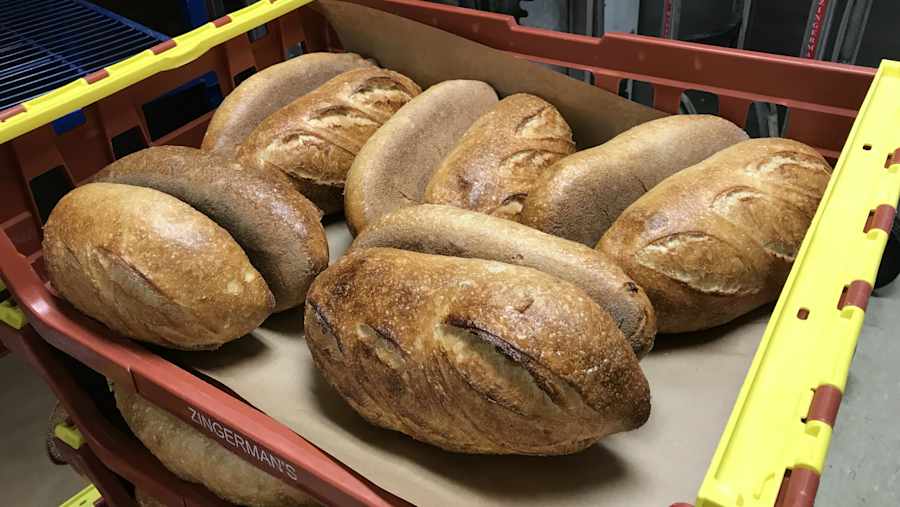
(Photo: Meredith Bruckner)
We started myself and eight other people in one-fifth of the building next door, making about eight different types of bread each day. We made 80-100 loaves for one customer, the Delicatessen. So we set up a separate business to supply to deli with bread. Humbly, I had hoped I would learn to become a good baker and teach and train a crew to do it because it’s a 24-hour process and it’s really a magical 8,000 year-old tradition that we’re stewards of, and I hoped we would do something that others would want to buy from us.
Emberling: I grew up in far eastern Canada in a province called Nova Scotia. One of four kids and grew up in a family-owned business that my grandfather had started as a Polish immigrant. So business and food were always a big part of our family’s culture. I’m Jewish, but there were hardly any Jewish people in the community so there was a lot of other forms of food around to explore, so it felt multicultural.
I left and I went to college in Boston, and I was very excited to leave Canada and get to the exciting the United States. While I was doing that -- supposedly studying -- I was spending a lot of time in Harvard Square and eating out. I came to Ann Arbor with my boyfriend at the time, who became my husband, for him to go to graduate school here, so I started working in the food world and I loved it.
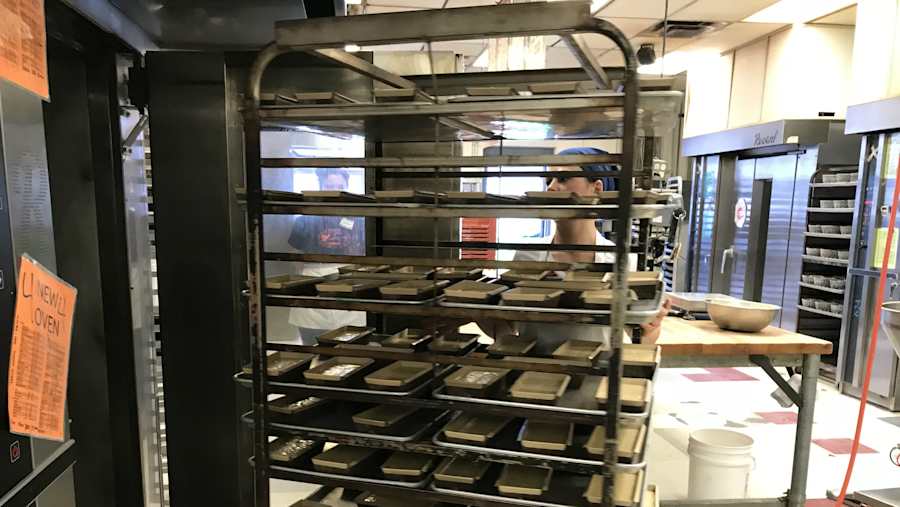
Trays of banana bread go into the oven (Photo: Meredith Bruckner)
I love working with people. I often say, "I love people. Even the people I don’t like, I really enjoy." I find people really interesting. So working at Zingerman’s has been perfect for me because it’s about food, which I love, it’s about people, and I really find small business just sort of fun, even when it’s hard -- it's almost more fun when it's hard.
I had been working in some restaurants in southeast Michigan, and restaurants are notorious for not being good places to work. I was looking for a really great place to work, and I saw one of the founders of Zingerman’s at the Delicatessen. He’s pretty distinctive looking (because) he’s about 6 feet 5 inches. And I didn’t know him. I went up to him and I said, “Hey Ari, where should I go to work? I’m looking for a really great place to work." And he said, "Oh, my friend Frank is opening a great bakery. You should go and see if you can get a job with him."
My childhood interest had really been baking, not cooking. And at this point I had already gone to cooking school in Paris and I thought, “Oh, I hadn’t really thought about being a baker," because there weren’t that many artisan bakeries in the country at that point. This was ’92.
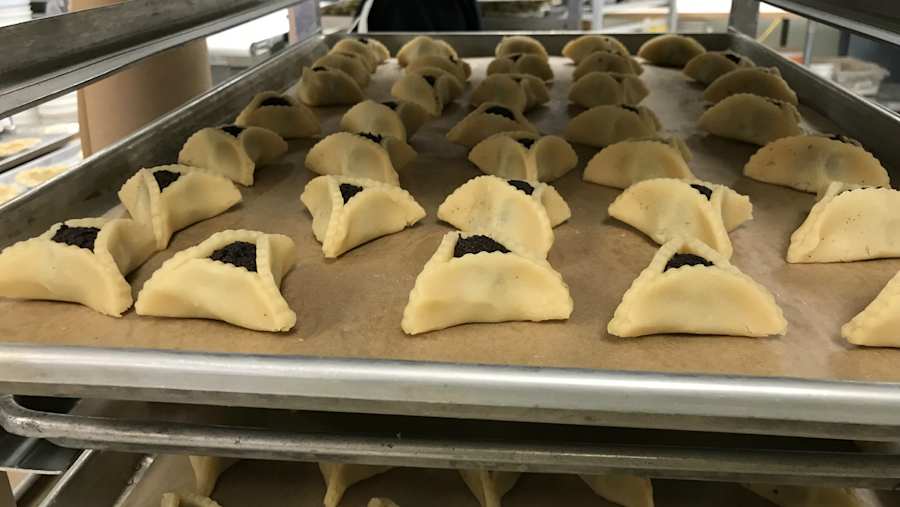
Handmade hamantaschen ready for baking (Photo: Meredith Bruckner)
I went and I interviewed and Frank didn’t call me back and I thought, "Oh, no, I’m a shoe-in. How come he’s not going to hire me?" So I called him and told him I’m really interested in the job and he said, "I know you have a baby and your husband’s in graduate school, and I’m not going to pay people very much and just didn’t really think it was enough money for you." And I said, "Isn’t that my decision?" And that was the start of our great relationship.
Carollo: Amy was part of the first eight, and she was a baker. Early on, she distinguished herself in being really, really interested and wanted to learn, and I realized what a complex thing the undertaking was. After a few months, she began to help manage the production of the bakery, and a year and a bit later we opened pastry -- Amy had formal pastry training -- and so she went over and managed the pastry part of the business for a couple years. And her husband got a job opportunity in Denmark, so off they went. These were the years before cellphones, so we sent letters and postcards and I’d ask her to come back. She was gone for four years.
By the year 2000 I realized I didn’t need another manager, I needed another business partner. Amy is really blessed with lots of great ideas and she’s really innovative. In 2006, we had this little space (points to the right of where we are sitting), and she came up with the idea of starting a baking school, and that’s been great and wildly successful. Here we are in our 26th year now and still having love for what we do.
How has the Bakehouse changed since 2000?
Emberling: Pretty tremendously. It’s a lot bigger than it was. I think there were about 60 people working here in 2000, and now there are between 120-140 people. We didn’t have this baking school that we’re sitting in. That started 10 years ago. We didn’t make decorated cakes. We didn’t have people working at night in the bread bakery.
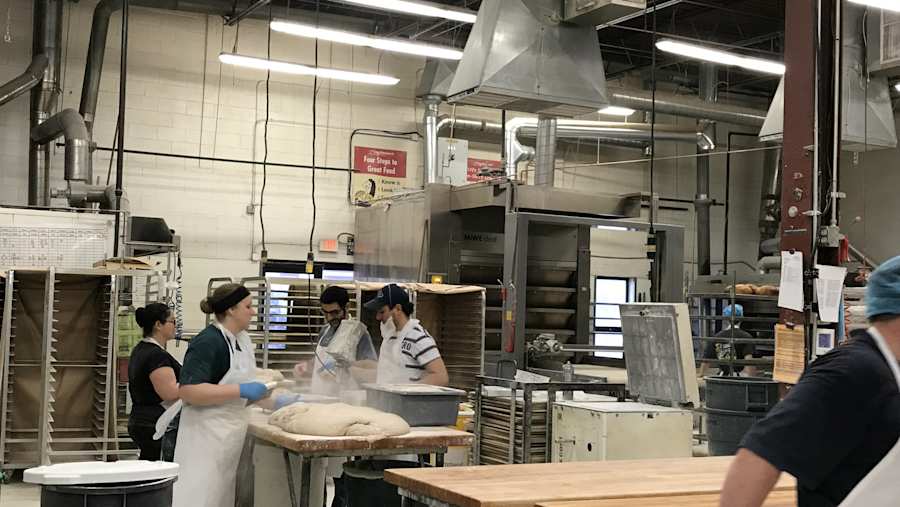
Bakers work 24 hours a day at the bread bakery (Photo: Meredith Bruckner)
The role of technology has changed tremendously. When I came back in 2000, we were barely using email and we were barely using cellphones. There was no social media. How we do marketing has totally changed. We now spend only 25% of what we used to spend on advertising because we don’t do very much print advertising anymore because we don’t have to.
Carollo: There are basically five components to the business. The bread making, that we started with. Pastry -- Amy really, as I said, had a love for the specialty cake business and she helped grow that into a solid component. She had the vision to start this baking school, which has grown to be over three-quarters of $1 million a year. The shop, which we’re renovating now, was originally a few folding tables from Office Max in the bread bakery. But that 800-square-foot business in this industrial park, it just surprises me on a weekly basis how many people are attracted to come out here.
Emberling: Another thing that’s happened is we’ve had a variety of food trends happen in the past 18 years. So the first one was the no-carb Atkins diet. And I think that the way people think about bread and carbohydrates has never reversed. It’s been impacted fundamentally. Restaurants used to always have bread on the table and we used to sell to a lot of restaurants. Now, many restaurants don’t serve bread at all.
So the views on bread have changed tremendously. We now have the gluten-free (diet), there was a period where sugar was really bad; butter comes in and out of fashion. Vegan has not been problematic for our bread because most of our bread is vegan, but it has been a problem for most of our sweet items.
Carollo: Mail Order has done this magic thing for us which is ship our baked goods all over the country for people who spent some amount of time often going to school here or visited their kids in town and became fans of our baked goods.
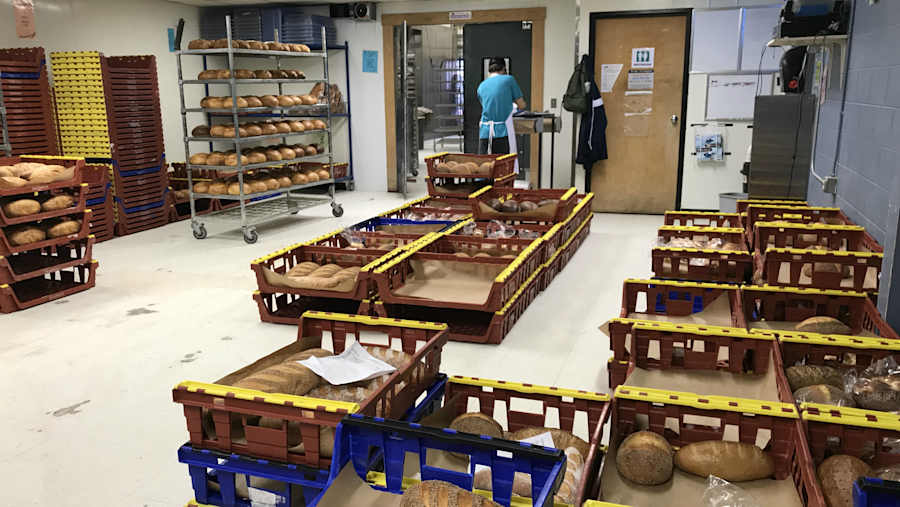
Bread ready to be shipped from the Bakehouse (Photo: Meredith Bruckner)
How long was the cookbook in the making?
Emberling: We had thought about it many years ago. We were approaching our 25th anniversary and thinking about what was going on in the bakery and I thought: We’re kind of at an inflection point and at some point there might be some succession. It’s a two-year process between writing a proposal, finding a publisher and then doing all the work of writing it (the book).
Carollo: As it turns out, there’s so much lead time in publishing that we only had seven months to do the writing. The recipe part of it was less hard because we’d been teaching classes. So that was just a matter of converting all the recipes to grams; having our kids double-check all those in the home. Amy wrote more extensively. Developing all the chapters was tedious and stressful. Amy compares it to having a baby. Now it just seems like it was fun, but it was real work.
Was it hard to share your secret recipes?
Emberling: There were a couple of recipes that I’d been holding onto irrationally. I decided we would share those. We have this baking school, and it actually builds on people’s understanding of the food and has added to the business. It helps us connect even more with our customers. We really want to be the community bakery. So we want to engage with people in the community in lots of different ways, and so some people would prefer to have a book at home or to come and learn a recipe here and make it themselves, and then there are people who are willing to shop.
What unique inspirations do you think you bring to the flavors and recipes here?
Carollo: I think I’m most responsible for having this really relentless drive for every day, try to look at the processes we’re using and making certain that we’re trying to improve and never waiting for our customers to tell us we need to sharpen something out. Good isn’t good enough. That’s my job. I’m sort of the optimizer.
Emberling: I’m somewhat traditional. I really like the standards that have survived the test of time. I have traveled a fair amount in my life, so I’ve gone to places and eaten things that have been in those people’s cultures for several hundred years. And that’s what I think I bring back. It helps people understand one another better and be more accepting of one another. You won’t see really funky things being made here. You’ll see more standards but made really well.
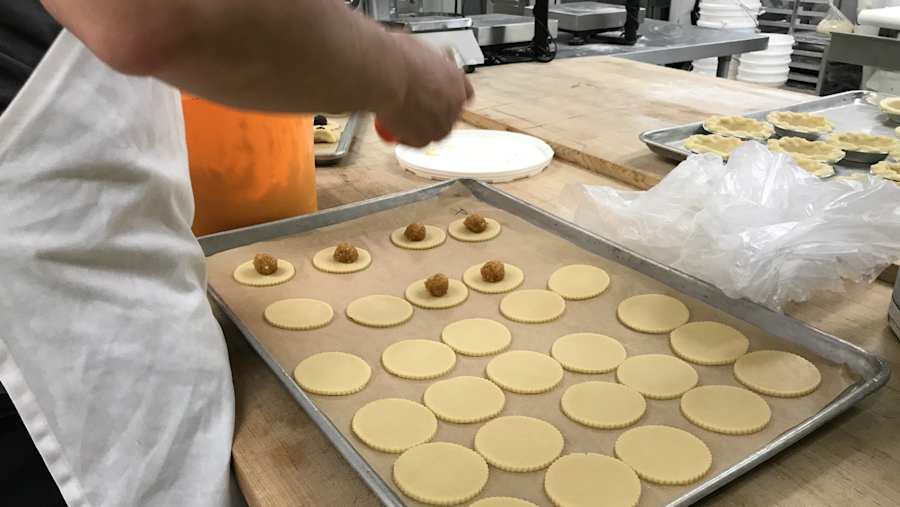
(Photo: Meredith Bruckner)
What’s your favorite loaf of bread and what’s your favorite pastry?
Carollo: We make a big country miche now that we’ve been making and selling for about a year. It’s got a little bit of rye in there and some wheat that’s grown on the Leelanau Peninsula. And it’s got a little spelt and a little buckwheat, and it’s an old-school country loaf with a real dark crumb. Just really nutritious and incredibly delicious.
Emberling: That’s really hard. I think whatever one is in front of me! I really like the French baguette. In food, I really like simple things that have so much flavor. They usually have very few ingredients but it’s an interesting process that allows for so much flavor. So I love that crispiness.
Carollo: Pastries, I can’t say just one, but I love our currant scones -- one of the original things we made -- and the oatmeal raisin cookies. It’s sweetened with Michigan maple syrup rather than just a whole bunch of sugar, really great big-flame raisins and really good organic oats.
Emberling: Pastry -- that is really impossible. I can’t choose one. I love them all.
Learn more about the Bakehouse here.
Related reading:
A chat with Zingerman's Ari Weinzweig
The Zingerman's Deli deals you should know about
Inside Ann Arbor's very own chocolate factory



